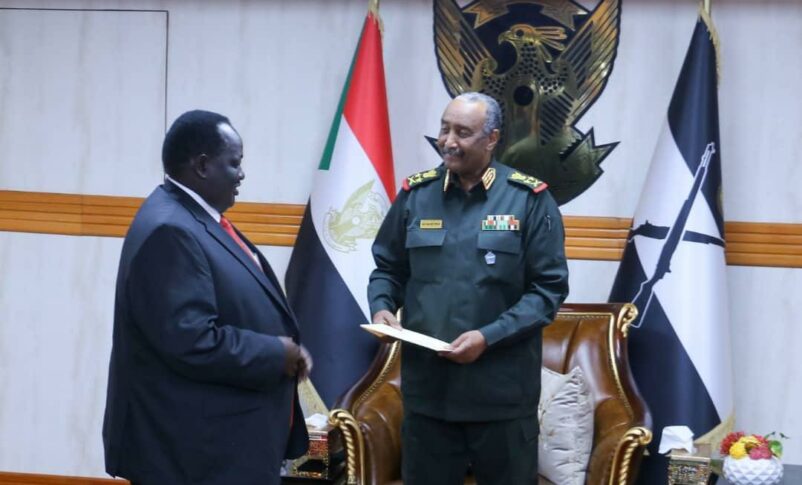Sudan, S. Sudan back regional efforts to end conflict in Ethiopia
September 7, 2022 (JUBA) – Sudan and South Sudan have intensified regional efforts to end to the conflict in Ethiopia, citing its significant role in regional peace and stability.
Speaking to Sudan Tribune on Tuesday, South Sudan’s security affairs advisor, Tut Gatluak Manime said President Salva Kiir and his Sudanese counterpart, Gen Abdel Fattah Al-Burhan vowed to support all efforts to end the conflict.
The two leaders also acknowledged Ethiopia’s role in the fight against terrorism.
“His Excellency the President of the Republic and Gen Abdel Fattah Al-Burhan are concerned about peace and stability in the region and they have agreed to step up and support regional and continental efforts to end the conflict in Ethiopia”, said Manime
The presidential aide revealed that hybrid efforts by the Intergovernmental Authority on Development (IGAD), through the office of its special envoy and the secretariat are being exerted to ensure a sustained provision of humanitarian aid as well as to facilitate the resumption of basic services and also to resolve the conflict peacefully are the priority.
These efforts, he added, seeks to push for a ceasefire deal between the warring factions.
To expedite this process, according to Manime, Kenya, Sudan and South Sudan have been asked by the friends of Ethiopia to deliberate upon and adopt a peace proposal that would lead to conclusion of a ceasefire and lay foundation for future political dialogue.
“There are efforts, joint efforts of the AU and IGAD, all suggesting Kenya, Sudan, and South Sudan work together on a proposal to end the conflict in Ethiopia”, he stressed.
Security experts and journalists are keen to underscore that conflict and instability trends in the Horn of Africa region continue to make it one of the most unstable regions in the world. Significant portions of the Horn of Africa have not been able to break free of the lethal cocktail of armed conflicts, violent crime, extremism, communal violence, political instability, and state failure that has plagued the region for decades. Most parts of the Horn of Africa of armed conflict and instability are concentrated near border areas, posing spillover risks and featuring powerful cross-border drivers, interests and actors.
Ethiopia, security experts say, is a key ally of the western world, especially the United States, which considers it an important regional security partner in the global war on terror. This has, thus, warranted the Ethiopian government to tighten border controls with Eritrea, Kenya, Somalia, and South Sudan.
Ethiopia has employed border control system and measures at several ports of entry.
The Ethiopian government deems attacks from the Tigrayan Peoples Liberation Front (TPLF) on its military a domestic terrorism act and launched offensives in response.
The TPLF has, on the other hand, asserted that its actions were self-defenses in the face of planned Ethiopian government action to remove it from the provincial government.
(ST)

